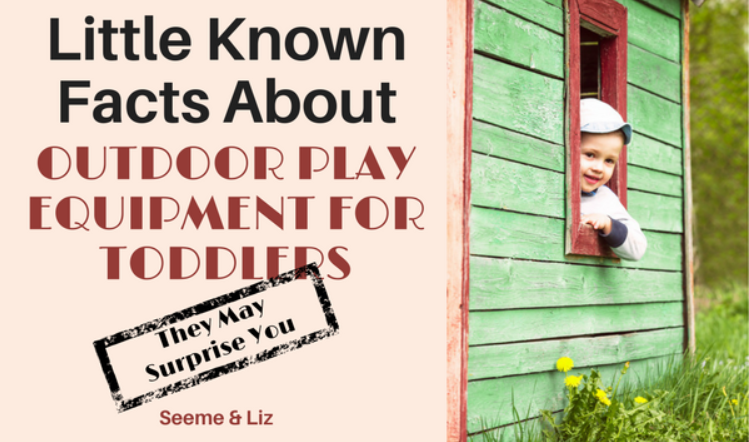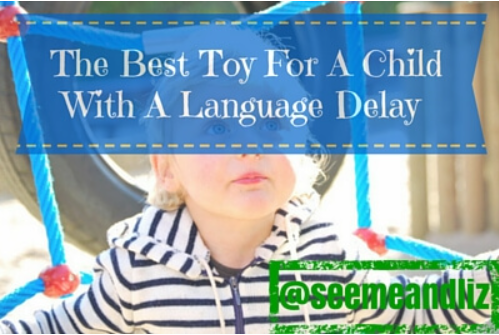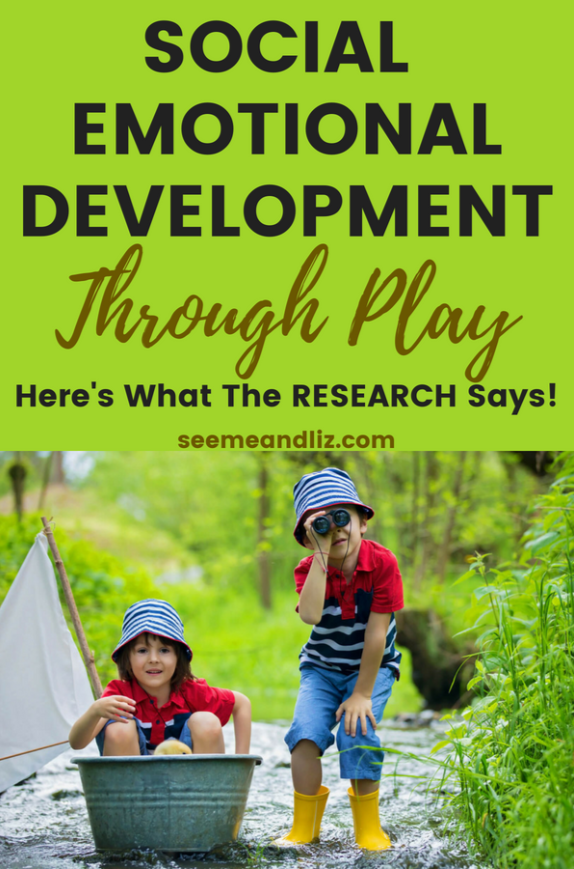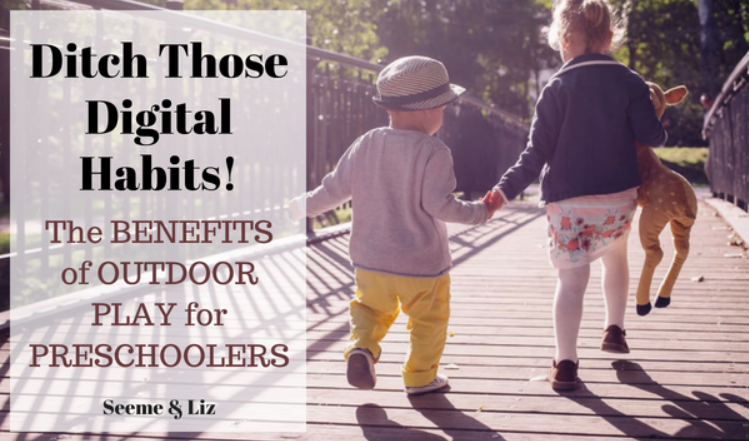There are many benefits to children getting out of the house and playing outside.
An article published by the Daily Mail in the UK, looked at studies that found that children who play outside often have better eye health than those that remain mostly indoors.
Selecting Outdoor Play Equipment for your Toddler
As a parent, it can be overwhelming trying to decide what kind of outdoor play equipment to purchase for your toddler.
I have come up with some suggestions to keep in mind when trying to determine which type of play equipment to purchase for your child.
Some of my “little known facts” revolve around how the play equipment can also help your child’s language skills blossom.
Toddlers Grow
The first thing to keep in mind is that your toddler will only be a toddler for so long.
Therefore if you are on a budget, try and find an outdoor play set that will grow with your child.
You don’t want to have to be replacing it every year or two.
A play set like the one pictured below will most likely be outgrown by the time your child is 4 or 5.
We purchased a wooden play house for our daughter when she was about 18 months old.
We thought about getting a small climber for her at first, but then decided on a playhouse as it would probably get more use.
Don’t get me wrong, kids climbers are great!
Some of our friends have them and the kids love pretending it’s a pirate ship, restaurant, airplane, etc.
However, I have always been a big fan of playhouses, but before having children of my own, I assumed these were more for older children who really enjoyed pretend play.
But when Grandpa wanted a gift idea for his granddaughter, I suggested an outdoor play house!
I knew that this was something that would grow along with her. And it sure did!
2 Types of Playhouses
WOOD
- These will require a bit of maintenance. We did not maintain ours and therefore it looked quite weathered after the first year.
- If you live somewhere where you get snow and cold temperatures, make sure you at least cover it up with a sturdy tarp over the winter. We didn’t do this until the 2nd year.
PLASTIC
- These do not really require maintenance.
- However, they may discolor and fade due to sun exposure.
To see my review on some wood and plastic playhouses click here.
An Outdoor Playhouse And Language Building Opportunities
I don’t even know where to begin.
As I mentioned above, you can get an outdoor play house for your toddler and she will grow into it.
The language opportunities are pretty much endless.
Depending on the age of your child, there are different things that you can do to encourage language development, pretend play and imagination.
I will list just a few here (I could write separate articles on specific age groups alone).
Toddler Play Equipment Language Building Opportunities for Kids aged 18 to 36 Months
This is a pretty big age range, but children’s abilities vary.
If your 2 year old’s language is above what I am discussing here, then check out the next level for language encouragement tips.
You can encourage some verbs at this stage as well as short phrases and following directions.
Here are a few examples:
- ♦ open
- ♦ close
- ♦ open the door
- ♦ close the door
- ♦ go into the house
- ♦ come out of the house
- ♦ label parts of the house (door, window, roof, bench, seat, bbq, oven, sink, faucet, names of colors) – of course it will depend on what the playhouse you choose comes with
- ♦ basic pretend play – have your child “cook” something for you and then give it to you to eat
- ♦ talk about where the front of the house is as well as the back to work on prepositions
- ♦ throw things on the roof and see if they will fall off (more prepositions and cause and effect)
- ♦ use your imagination and find more fun things that can be done!
Strengthening Language Skills With Outdoor Play Equipment for Kids 36 Months and Older
At this age children begin interacting with each other as well as with you.
More advanced forms of play will be occurring now.
Here are some ideas for children at this age when they are using outdoor play equipment.
- ♦ Be creative, pretend the house is something else, for example, it is now a boat.
- ♦ Talk about how you can’t get out of the boat because the water is too deep (and maybe there are sharks).
- ♦ Talk about what meals you might eat while on your “house boat”. Maybe you will jump out and go for a swim. Or maybe the house is a castle.
- ♦ Your child can be a wizard who lives in the castle and turns the food he makes into crazy things like a plate full of snakes (put grass on a plate and pretend it is snakes)
- ♦ Bring some playdough outside and “cook” in the house. If you don’t have any playdough just use some plastic food.
- ♦ Why not turn the house into a restaurant and your child can make meals for you and his friends!
- ♦ If your child says “I’m bored” make sure you help him not be so bored by giving him some of these suggestions.
- ♦ Some children are great at coming up with fun and creative ideas but others need a little guidance.
Water/Sand Tables For Toddlers
Here is another great example of outdoor play equipment for toddlers.
Water and sand tables are definitely geared towards toddlers (12–36 months), however some older children will still find them fun.
My children started outgrowing their water table around the age of 5, but they would not let me get rid of it until my daughter was 7 and my son was 5.
When purchasing a water/sand table, make sure that it comes with a cover to keep the bugs out!
Here are some examples of how you can encourage your child’s language development while playing at a water/sand table:
- ♦ Talk about how the water feels: cold, warm, hot, wet
- ♦ Discuss objects you can put in the water: boats, cups, bowls, scoops (plastic shovels), plastic balls
- ♦ For some STEM learning, find out if some items float while others sink.
- ♦ Talk about some action words related to the items you are putting in the water: splash, dump, pour
- ♦ Add some soap to the water and make an outdoor bubble bath. Your child can give a doll a bath!
Some of these tables (like the one pictured above) are designed to have water on one side and sand in the other.
A note of caution: if you use the table as intended I guarantee you will have one big mud puddle.
As long as you are ok with this, your child will love mixing water and sand. You can talk all about making mud pies!
We ended up filling both sides of ours with water.
I know some people that just fill both sides with sand. This is up to you.
Or if budget isn’t an issue and you have a large yard, why not get two tables, one for sand and one for water!
But be prepared for mixing of water and sand to happen from time to time.
What child doesn’t love mud?
Encouraging Language and Imagination With A Sandbox
Here are a few more ways that you can subtly help your child’s language development with a sandbox.
12 to 36 Months
- ♦ Begin by following your child’s lead
- ♦ Talk about how the sand feels: rough, wet, dry, bumpy
- ♦ Talk about action words: dump, pour, mix, scoop
- ♦ Talk about items you have in the sandbox (nouns): sand, pail (bucket), shovel, car, rake, etc.
- ♦ Dig holes and hide toys and then have your child try to find them.
- ♦ Make sure to label, label, label (especially the items your child may not have a word for).
3 Years and Older
- ♦ Encourage your child to get creative
- ♦ Talk about things you could make in the sand. Maybe build a road with mountains that lead to a castle.
- ♦ If building a castle for example, use some more advanced vocabulary such as “moat, turret, catapult, crown jewels, watch tower,” etc.
- ♦ set up an archaeological dig
- ♦ Make a volcanic eruption – build your sand volcano, dig a small hole in the top and then add a bit of vinegar and baking soda and watch it explode.
If your children are really into science, check out my science kit post!
Take this time to talk about volcanoes and where they are found. Maybe even set up an “archaeological dig” around the volcano - ♦ Go on a treasure hunt – hide items around the back yard and have the treasure hunt end up in the sandbox.
Use pirate vocabulary during this activity.
For example: anchor, ashore, bounty, deck hands, explore, cannon, captain, raid, thief, vessel, walk the plank”, etc.




